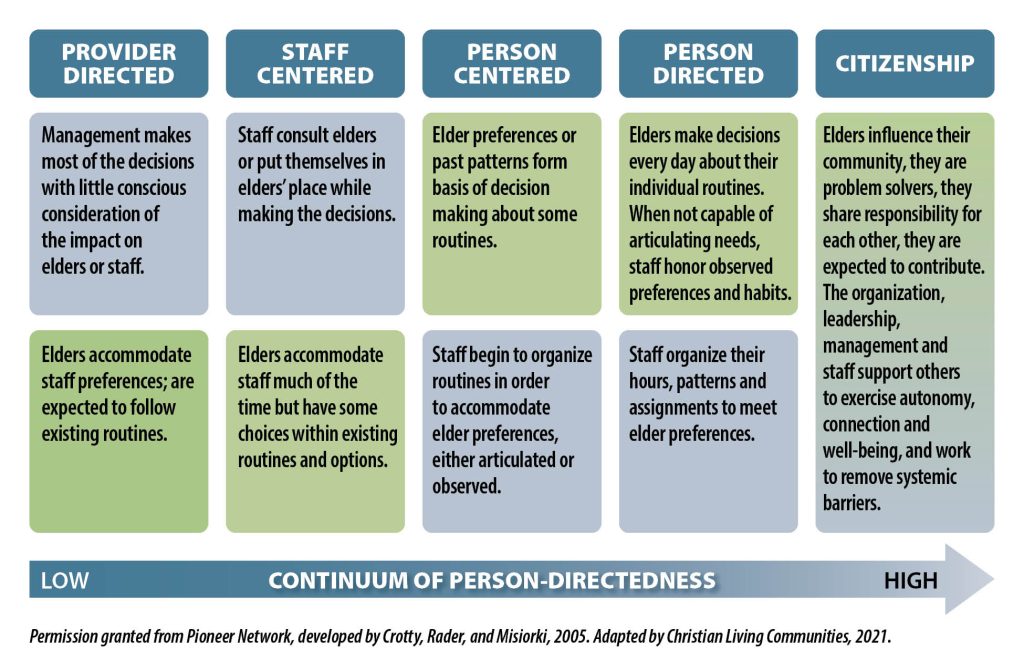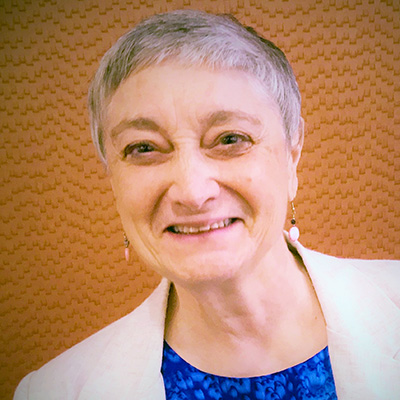Resident Spotlight: Verna Cavey & The Resident-Directed Senior Living Philosophy
A culture shift has been underway for decades at senior living communities across the globe, as more and more communities strive to move beyond provider-directed cultures to resident-centered cultures. Clermont Park’s philosophy goes beyond this, embracing a resident-directed culture that is moving toward citizenship.

Clermont Park resident and educator Verna Cavey is an ardent advocate for this shift in senior living culture, sharing her writings and teachings on a state, national, and now international scale. Verna presented at the Global Ageing Conference in Glasgow, Scotland in September 2023 during a panel discussion titled “Listening to and Empowering the People We Serve.”
The Global Ageing Conference
Written by: Verna Cavey
The Global Ageing Conference in Glasgow, Scotland took place this September and I promised that I would report to you. Having already planned my final trip to the U.K., the opportunity to present at a global conference was an extra bonus. Six hundred people from around the world attended. The panel, where Clermont Park sat, was focused on empowerment of residents. Also on the panel were representatives of Schlegel Villages with the Research Institute of Aging at the University of Waterloo, Ontario, Canada. (Schlegel is similar to Clermont Park in that it has a resident-directed philosophy; it has multiple communities, one of which sits by their research center on aging.) Also on our panel was a researcher from the University of York in England.
Attendees were excited by our discussion about resident-directed community, where residents collaborate with team members and leadership. I spoke about Clermont Park residents using their gifts in the gardens, the store, the library, programming, etc.. Internationally, many communities are now person centered; only a few can function as resident directed. One attendee yelled out, “I’m moving to Colorado.” Another, a woman highly respected internationally, said that she has been struggling to do a resident-directed model with 12 residents and couldn’t imagine how we did it with an entire community.
Highlights from conference sessions, practitioners and researchers
- Researchers from England are developing materials for older persons going through stressful moves. For example, they may be moving out of their long-time homes into aging communities; or they may be independent living residents moving into assisted living or memory care. This knowledge about how best to support persons going through emotional transitions will be valuable to Clermont.
- The keynote speaker, Sir Geoff Mulgan, said that we only need ask one question to test the level of loneliness: If you have troubles and are in need of help, can you pick up the phone and call a friend or family member who will jump in to support you? If not, seek out and ask for other support which is available to you.
- The concerns that international participants expressed were the same as those that we discuss over coffee at Clermont. Hearing the perspectives from so many cultures (as well as learning about solutions) really does encourage innovative thinking at CLC. (Notable were the tremendous optimism and energy coming from African practitioners in spite of the many challenges they face – war, famine, lack of funding, etc.)
- It is very clear that, in both North American and the rest of the world, services for older persons remaining in their homes is where the future is going. The big challenge is to make sure that people are not lonely in their homes. Israel, for example, discussed their creation of places where older people in their neighborhood can gather, whether it be a pub or a lifelong learning center.
- In one Israeli college town, college students stayed in the homes of older people for free. Elders report feeling safer knowing someone was there at night. They may watch a movie together with pizza or the student might drive them to the grocer. Elders report having fun, feeling younger and having a reason to get up in the morning. And, they are able to remain in their homes. The college students report a positive change in their attitudes about older people. (Many more co-housing ideas for elders are being created.)
- It was stated that lifestyle, environment and social connection were important influencers to health, if not more so than medical systems where most of our money goes.
- People who retire early and haven’t anything purposeful to do in life are getting sick. Social belonging and volunteerism are important. There are also new employment agencies for 65+ and more 65+ entrepreneurs wishing to pursue a new career.
- A greater emphasis is given more to weight and strength training which research is showing to have a huge benefit for health and mobility even in much older age.
- While we have heard reports of early-onset dementia in persons in their 40s and 50s, we are now hearing of it in persons in their 20s and 30s – though it is still a small percentage.
- Not surprising, there was a representative from Singapore, a city which is designing remarkable communities for healthy aging. Singapore is sensitive to age-inclusive priorities and challenges, opportunities for social cohesion, inter-generational interactions, and wellness and technological adaptation.
- Palliative care was an essential topic supporting the idea that we should both live and die pain free. Among the exhibits, I was fascinated by the artificial intelligence which was able to pick up degrees of pain from the face of a person with dementia even though they were unable to communicate.
- Leadership believes that they must move forward in adapting our policies and infrastructures to support aging populations who are experiencing both climate change and crisis created by climate change.
- Massive amounts of the Asian population are aging. In Israel, life expectancy is among the highest in the world and is increasing by six hours per day. Italian villages are aging out. The world is working together, sharing both challenge and success, to enhance the quality of life for the increasing number of older persons. The UN has begun work on the Convention for the Rights of Older Persons.
- The Rolling Stones, in their eighties, just put out their latest CD album.
Addendum. Visit to Erskine community just outside of Glasgow, Scotland: Erskine has expansive grounds and buildings. The majority of space is given over to memory care and residents are free to move safely both inside and out. The day I was there a woman dressed like the 1940s was singing old songs while residents had cream tea. Harry’s Cafe, a little diner with a 40s/50s feel, is available to residents and neighbors who visit from outside the community. Outside organizations, such as the Rotary Club, use Erskine space for meetings. Families came and went. Staff walked through with their pets. Being Scotland, bagpipers, of course, visited from time to time. Another interesting element was their namaste rooms where residents and staff could relax with soft lighting, music, a water feature and a video of nature.





